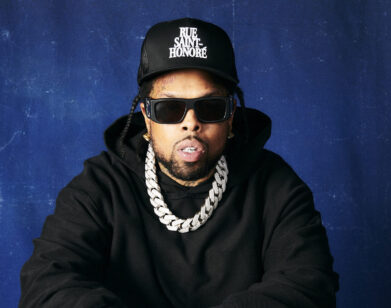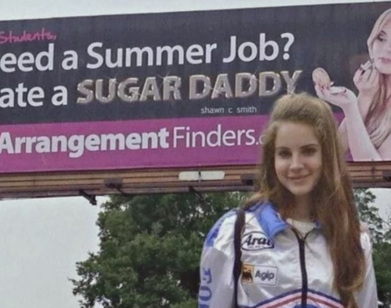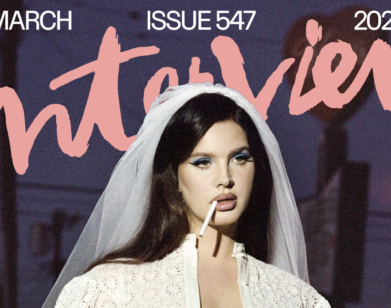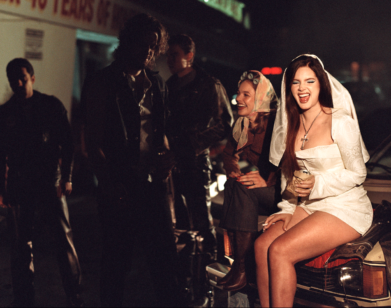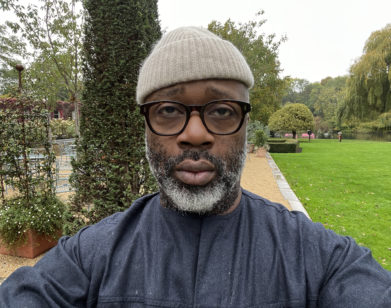The People vs. Young Thug
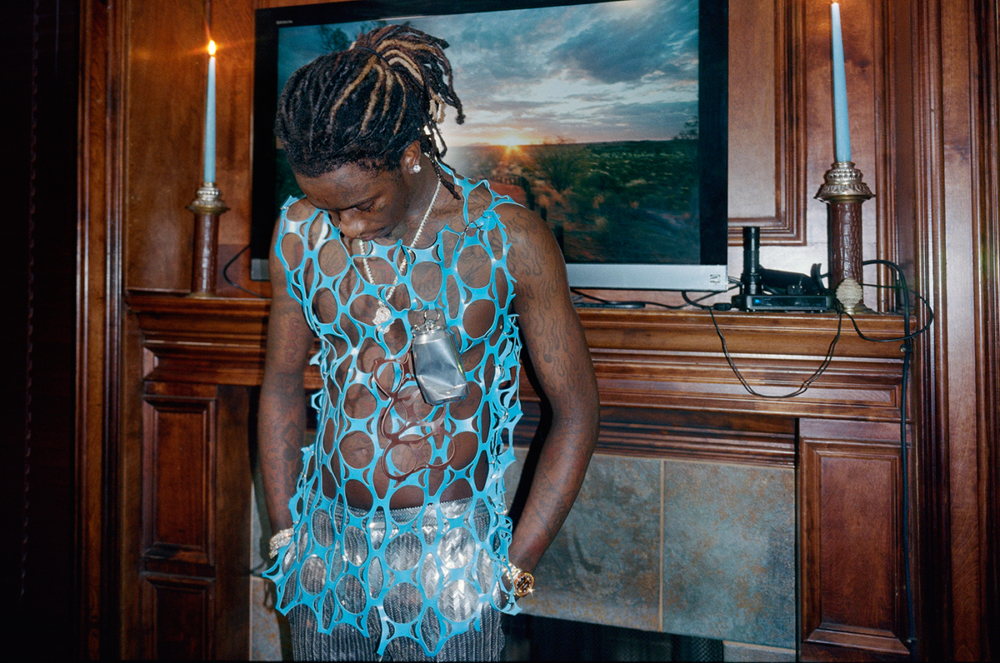
Marvelous. Awesome. Astounding. Wonderful. Fantastic. Amazing. Many of the words we use to describe what we appreciate contain etymological traces of the unreal, as though it takes a hint of magic to really move us. In most cases, that otherworldliness is just a quirk baked into our language, but in special instances, good art appears to us as something genuinely alien. I was, in fact, amazed when I first heard the voice of Young Thug on his 2013 mixtape, 1017 Thug. Who was this then-21-year-old rapper from Atlanta whose voice jolted unpredictably from a guttural mumble to a falsetto squeal?
Evidently, I was not the only one. Five years and 14 mixtapes later, Thug has become the kind of star one roots for, as though his music’s popularity were evidence of a strangeness that we all share. Described as oracle-like in his creative process, he spends hours on end layering grunts and shrieks into melodies and lyrics. Although he has been heralded for his androgynous style, the rapper and father of six has remained silent about his personal life. In a digital age defined by babble, he has created the blueprint for music that privileges a voice’s rhythm and emotion over words and explanations.
Despite arriving to the public from opposite ends of the hip-hop industrial complex, Young Thug and Virgil Abloh, the artistic director of menswear at Louis Vuitton and the founder of his own label Off-White, share a fantastical quality. It is as difficult to imagine today’s youth culture without them as it would have been to predict their unlikely rises to fame. Another thing the world’s first postmodern rap superstar and the world’s first architecture–student–turned–fashion–emperor have in common is the democracy inherent in their work; even more than the things they make, their legacies will be defined by the thousands of SoundCloud rap careers and Instagram t-shirt labels launched in their image.
A week before his incarceration for a parole violation, Thug spoke to Abloh and me about creativity and ambition, and the weird places those two things come from. —THOM BETTRIDGE
———
THOM BETTRIDGE: One of your most famous songs is called “Stoner,” and you often refer to yourself as being a stoner in your lyrics. What does that word mean to you?
YOUNG THUG: A stoner is a person whose mind is blown out of proportion. They sing as if they’re empty-headed, but they still got it together.
VIRGIL ABLOH: I feel like something the two of us have in common is that we still work as hard as we needed to when we were young. You’ve always had a crazy work ethic.
THUG: Always, always, always.
ABLOH: How many songs do you think you’ve recorded in your career?
THUG: Maybe 15,000.
BETTRIDGE: What?
ABLOH: Crazy!
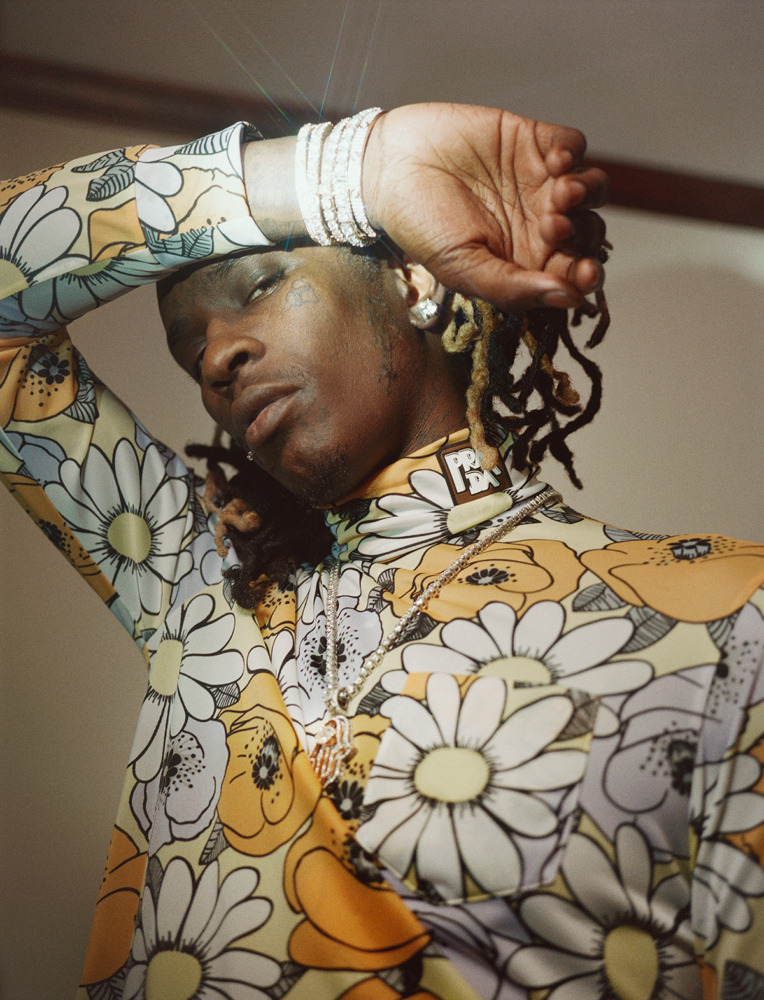
Turtleneck by Prada
BETTRIDGE: How do you maintain that level of productivity? What kind of coffee maker do you have in your studio?
THUG: I just stay in there. I keep clothes in the studio. I slept there last night. To be honest, I hate traveling so much, because I’d rather be in the studio.
ABLOH: I can’t work in my studio without music. I don’t like silence. I’m listening to John Coltrane. I’m listening to Miles Davis. But I’m also listening to whatever new rap is coming out that week. I have teams in Milan, Italy, London, and America, so as long as I have a fully charged iPhone, I feel like I can change the world. I’m talking on that phone, but I’m also constantly listening to music. My next Louis Vuitton collection is going to be based on Michael Jackson, and when I have Michael singing in the background, it’s a different type of shirt, it’s a different kind of boot, it’s a different fit of pants. Music is key.
BETTRIDGE: Each of you has spent your career developing an aesthetic that didn’t exist before you started. In the beginning, before you made it, did you feel like you were different than other people?
THUG: I’ve always felt different—from the beginning. I used to think that I saw things that other people didn’t see, that I could put things together in a way that the average person couldn’t.
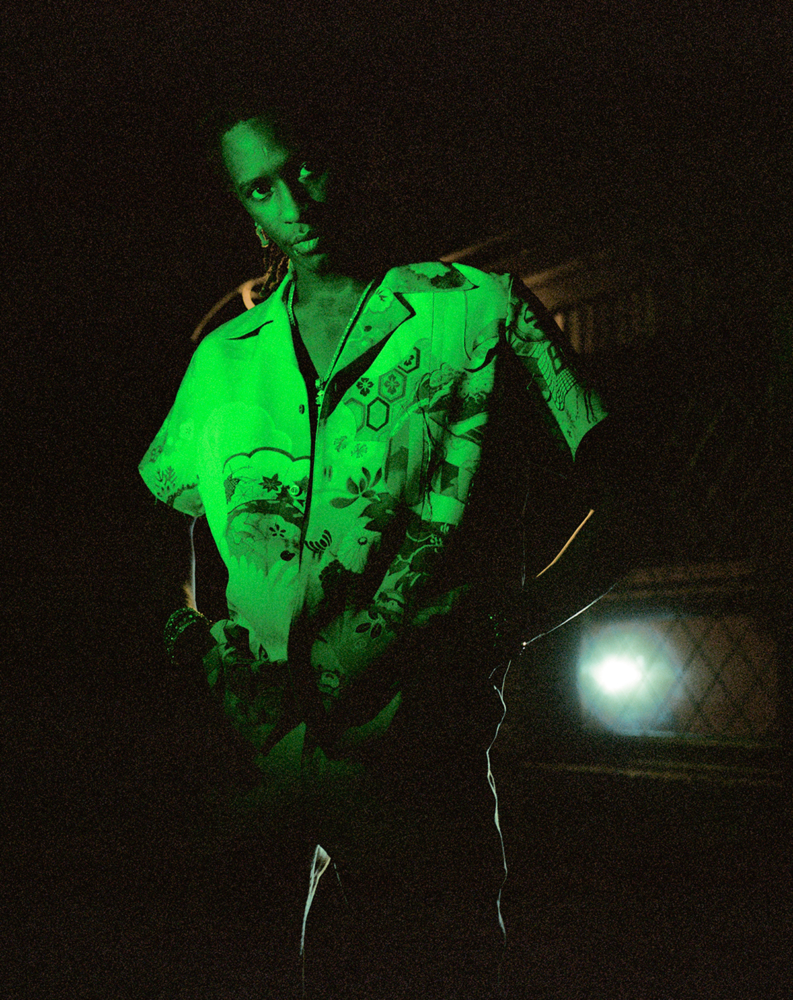
Shirt and Pants by Maison Margiela Artisinal. Designed by John Galliano
ABLOH: It was the same for me. I got into fashion because I wasn’t completely satisfied with what I was seeing in stores. I wanted to offer a new vibe.
THUG: If you don’t like something, you kind of have to create your own look. When I didn’t like what I was listening to, I just had to create a whole different album, or a whole different mixtape. It’s still like that for me.
ABLOH: It’s funny, because what made us different when we were younger is exactly the thing that makes people celebrate the work we do. Part of my equation is to inspire the next generation and to help them think outside the box. When I was growing up, I didn’t know that I could be showing in Paris, because I didn’t see anyone doing that who looked like me. Even when I just walked into a luxury store, people would look at me like I didn’t belong there.
THUG: And now niggas are the brand ambassadors for this shit. It’s crazy as fuck.
ABLOH: When me and Kanye first went to fashion shows, they wouldn’t let us in. We’d have to get back in the car and drive around the block. Now this collective of us is the whole culture. How we wear clothes and how we make our art is what rock ’n’ roll was for previous generations.
THUG: We are the ones extending it.
BETTRIDGE: What advice do you have for young people who are different like you?
THUG: It’s simple: Keep going. Don’t ever give up. Some people say that just to say it, but I always stress it because it’s the truth and it really works. Everybody will get a chance. Even if your chance is not right now, if you keep going, you will get your chance. So just keep going, keep going, keep going, and one day it will be your turn. And when that happens, you just have to take full advantage of your turn.
ABLOH: That’s the same exact advice I would give. You know, what a lot of kids don’t realize is that they just have to unlock what they do in their minds and focus on what makes them different. Once you amplify what makes you different, all of a sudden people will be attracted to your difference.
BETTRIDGE: What’s the biggest challenge you’ve faced in that process?
THUG: Other people who think like me. Other humans who feel like me and think like me are what scares me. The biggest challenge is going up against someone who is identical or better. And not, like, physically going up against them, or, like, beefing with them, but being in the same lane as someone else at the exact same time. That’s the biggest challenge to me.
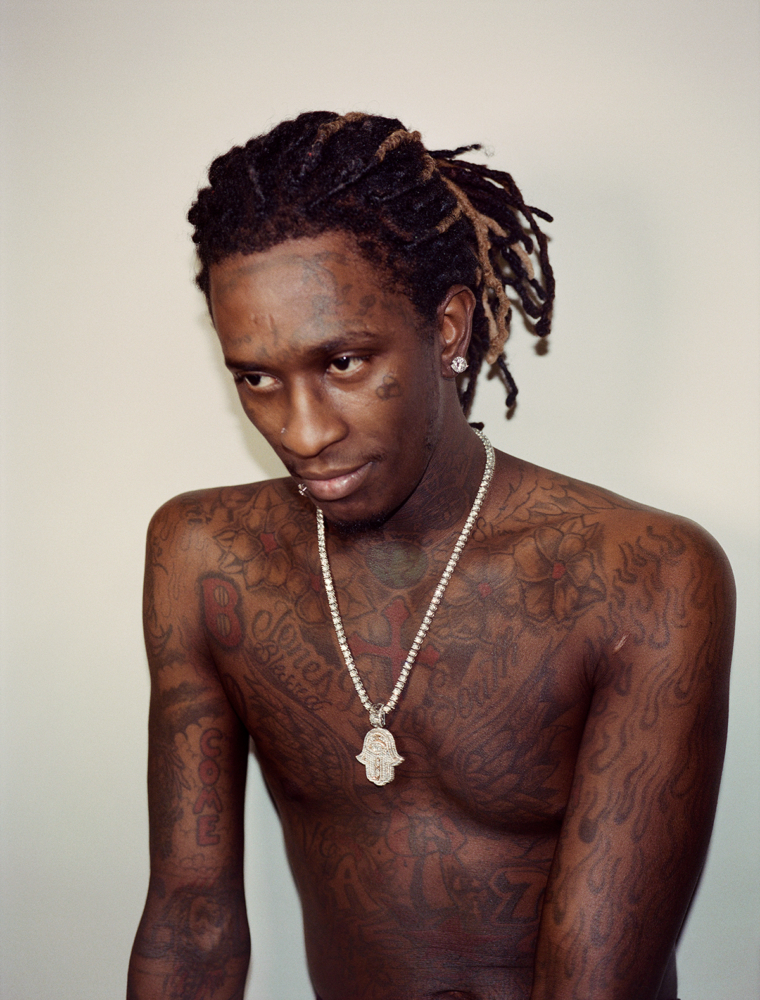
BETTRIDGE: Who is in your lane?
THUG: A lot of people, but I don’t like to drop names. We’re all just striving.
ABLOH: But the key is to stay unique, always. Because even if someone is similar to you, they will start to fade away. The thing you have to remember, too, is time. Thug and I are working at an unnatural pace, 24/7, and those who want to do it, too, have to do it at the pace we make. I sleep four hours a day.
THUG: You love doing it to the max, huh?
BETTRIDGE: Was there advice you got when you were young that helped you become the men you are today?
THUG: Yes, from a few of my big homies. I’ve always been around older people. And I loved the artists that I listened to who spoke to me. I loved listening to that realness, and seeing the way they did it.
ABLOH: What kind of music did you listen to growing up?
THUG: Hot Boys, DMX, Dru Hill, Mariah Carey, Monica, Yeezy, Gucci [Mane].
ABLOH: Are there any new artists who inspire you?
THUG: There’s a lot of little guys. They’re so inspiring to me, because they’re so young and having fun with it. It makes me want to have fun.
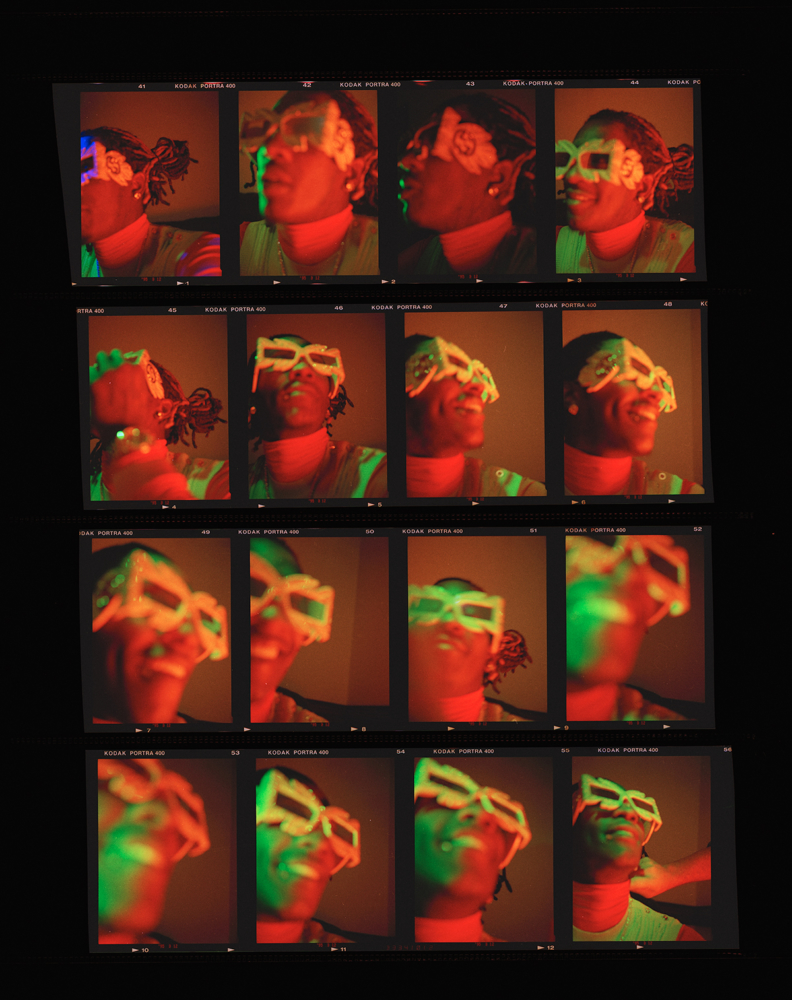
Vest by Versace. Turtleneck by Raf Simons. Sunglasses by Gucci
ABLOH: I know that family is also important to your ecosystem.
THUG: It is. And the family is perfect. My sisters and brothers are perfect. My mom is perfect. I just talked to her a few hours ago. Everybody is riding a wave and coasting on it. They’re on fire.
ABLOH: In terms of writing lyrics, what are the topics you started your career focusing on?
THUG: When I first started, the topic was real-life situations. But I now spend maybe 16 hours a day in the studio—I spend almost all my life in the studio—so I try to turn everything I go through in those hours into something. Anything crazy, or iconic, or even a mistake—whatever it is, I feel like it’s precious. That’s my concept.
ABLOH: I need to congratulate you on Slime Language. Your version of Elton John’s “Rocket Man” on your new EP is one of the many masterpieces you’ve made.
THUG: Thank you so much. I actually first recorded that song, like, four years ago.
ABLOH: How do you feel about it being released?
THUG: I feel good about it. I think it laid another foundation.
ABLOH: What’s inspiring you creatively at the moment?
THUG: The art is. All of this, everywhere. Man, actually, your clothes and shoes are so dope.
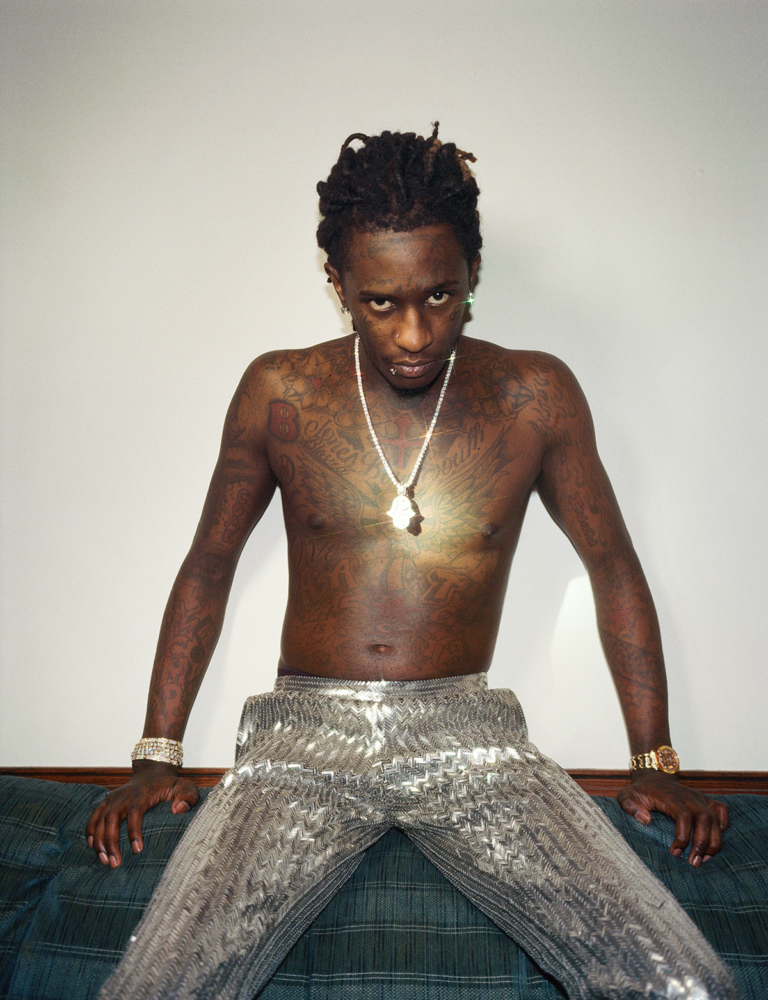
Pants by Givenchy
ABLOH: I appreciate that. In my mind, you have one of the most progressive takes on fashion. Were you always into it?
THUG: I’ve always just been putting so much stuff together. I’ve invested in pieces that I could put together on any level. I didn’t care about matching, or matching layers. I just let it talk the way it talked. It was just genuine. I really nailed the strategy.
ABLOH: One of my favorite moments of seeing someone rock Off-White the way I intended was seeing you do a show where you had a Cuban link chain on a black sneaker. You might not even remember it, because you’ve done so many fits, but I remember posting it. I thought it was such innovative styling.
THUG: You liked that?
ABLOH: I think those kinds of combinations make designers step their game up and think outside the box. Because artists are free to do anything when it comes to the way they wear clothes.
“I love stages. For me, the most important thing is the view.” —Young Thug
THUG: I love shopping.
ABLOH: You do? And I bet you have a lot of fresh pieces being sent to you.
THUG: Yes, but I enjoy shopping. Becoming a superstar really limits what you can do—I can’t do everything no more—but I love the shopping I can do.
ABLOH: When it comes to album packaging, do you have a lot of ideas about that?
THUG: I always have ideas.
ABLOH: I loved doing all of those early Kanye albums and Watch the Throne. I’ve always had a passion for it, because when you design the packaging, you get to make the Coca-Cola logo for this crazy content. Are you very involved in your set designs on tour?
THUG: I love stages. For me, the most important thing is the view.
ABLOH: We should link and do a set design—mix some Off-White and Louis Vuitton, and just go from left to right with it.
THUG: That’s dope.
ABLOH: What excites me about culture right now is collaborating with the best of our time. We’re building the new pyramids.
BETTRIDGE: For each of you, what’s something you dream of doing that you haven’t done yet?
THUG: I dream of winning 20 Grammys. I dream of being acknowledged as the best rapper alive and the richest rapper alive.
ABLOH: I want to design a spaceship.
———
Grooming: Arlene Martin.
Production: Kalena Yiaueki at North Six.
Photography Assistant: Dean DiCriscio.
Fashion Assistants: Malaika Crawford, Dominic Dopico.
Production Assistants: Marcie Cabarga, Aarion Joseph.
Post-Production: Two Three Two.

